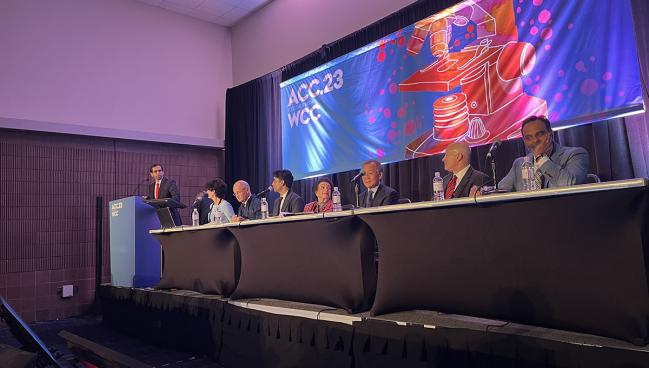HALO: Baxdrostat No Better Than Placebo in Uncontrolled Hypertension
Trialists believe the results, at odds with the positive BrigHTN trial, stem from unexpected benefits in placebo-treated patients.

NEW ORLEANS, LA—The phase II HALO trial of baxdrostat, an investigational aldosterone synthase inhibitor, in patients with uncontrolled hypertension failed to meet its primary endpoint, with placebo effects and poor adherence coming into play.
Though patients receiving baxdrostat at three different doses had drops in seated systolic BP of 16.0 to 19.8 mm Hg through 8 weeks, there were no significant differences compared with placebo-treated patients, who saw an average decline in BP of 16.6 mm Hg, Deepak Bhatt, MD (Icahn School of Medicine at Mount Sinai, New York, NY), reported here at the American College of Cardiology/World Congress of Cardiology (ACC/WCC) 2023 meeting.
The results are somewhat unexpected after baxdrostat demonstrated significant placebo-corrected reductions in BP in the phase II BrigHTN trial, which included patients with treatment-resistant hypertension.
As for what happened in HALO, “I would speculate that as has happened in other hypertension trials, such as with renal denervation, there was a Hawthorne effect such that the patients were more adherent to their background therapy than they normally were,” Bhatt told TCTMD via email.
“And paradoxically, at the same time, [it’s possible they] were less adherent to the study drug (perhaps because they saw their blood pressure was already better),” he continued. “There could have also been some white coat hypertension that was prominent in some of the enrolled patients. Hopefully, this will all be sorted out in the planned phase III trial.”
As Bhatt noted, AstraZeneca entered into an agreement to acquire CinCor Pharma, which developed baxdrostat, back in January to gain global rights to the drug, a deal worth an estimated $1.3 to $1.8 billion.
Large BP Decline With Placebo
In phase I studies, baxdrostat, a highly selective aldosterone synthase inhibitor, was shown to induce a sustained reduction in plasma aldosterone without affecting cortisol levels. Then in the BrigHTN trial, the drug provided a mean placebo-corrected reduction in systolic BP of 11 mm Hg in patients with treatment-resistant hypertension.
HALO enrolled a different group of patients with uncontrolled hypertension (mean seated systolic BP ≥ 140 mm Hg) on a stable antihypertensive regimen consisting of an ACE inhibitor or ARB; an ACE inhibitor/ARB plus a thiazide diuretic; or an ACE inhibitor/ARB plus a calcium channel blocker.
After a run-in period lasting 2 to 4 weeks to assess adherence, 249 patients (mean age 60 years; 47% women) were randomized 1:1:1:1 to placebo or one of three doses of baxdrostat (0.5, 1, or 2 mg), on top of their background regimens. Most patients (73%) were white and 24% were Black; slightly more than half (53%) reported Hispanic ethnicity.
At baseline, mean seated systolic BP was 146 to 148 mm Hg across groups, and mean seated diastolic BP was 82 to 84 mm Hg.
The primary endpoint was the change from baseline to 8 weeks in mean seated systolic BP. There were declines of 16.0 to 19.8 mm Hg across the three baxdrostat doses, with no significant declines after correcting for the large drop in the placebo group. The findings were similar for diastolic BP.
The proportion of patients who achieved a systolic BP of less than 130 mm Hg at 8 weeks was 56.3% in the placebo group and 57.1%, 53.2%, and 71.7% across the three baxdrostat dose groups; there were no significant differences compared with placebo.
All three doses of baxdrostat were associated with a significant reduction in serum aldosterone compared with placebo. Plasma renin activity tended to increase with the two highest doses of baxdrostat, although the difference compared with placebo was significant only for the 1-mg dose (P = 0.013). These changes were less than what was observed in the BrigHTN trial, suggesting worse adherence to the study drug in HALO, Bhatt said.
Overall, baxdrostat was well tolerated, he said, with only six patients having adverse events of special interest—four with hyperkalemia/potassium increase (three at the 2-mg dose and one at the 1-mg dose), one with hypotension (at the 0.5-mg dose), and one with hyponatremia (at the 2-mg dose). All of these patients recovered after interrupting treatment (four cases) or stopping it (two cases).
Impact of Nonadherence
Bhatt and colleagues delved into the potential impact of nonadherence on the study results. Investigators measured plasma levels of baxdrostat at 8 weeks, and found that 36% of patients in the 2-mg arm had drug levels below 0.2 ng/mL, a level less than 1% of what would be expected if they were actually taking their pills. This was discordant with what sites were reporting in terms of adherence based on pill counts, Bhatt said, noting that the issue seemed to be confined to just a few of the study sites.
In a post hoc analysis focused on the patients who had plasma levels indicative of adherence, the 2-mg dose of baxdrostat was associated with a placebo-corrected decline in systolic BP or 7.9 mm Hg (P < 0.01).
“This finding will need to be confirmed in appropriately powered phase III trials,” Bhatt said. Those will “give us a much more precise estimate of efficacy, of course, and also of safety, but my prediction is in the resistant hypertension population, where there’s such a great unmet need, it’ll end up being a useful addition to the armamentarium.”
Discussing the results after the presentation, Nanette Wenger, MD (Emory University, Atlanta, GA), addressed the impact of nonadherence. “You all know both as clinicians and clinical trialists that very often patients will take a tablet out of the bottle and put it in a pillbox and it will remain there rather than being ingested,” she said. “So we will have to do something in a subsequent trial to see if we can coach patients so that we get reasonable adherence, because a marked placebo effect and an intervention’s suboptimal adherence is guaranteed to torpedo a trial of hypertension therapy.”
Excitement About a New Class of Antihypertensives
Despite the disappointing results from HALO, Wenger said she’s excited about the baxdrostat’s prospects, noting that poor hypertension control remains a major worldwide problem. “We have not had a new antihypertensive class of drugs in well over a decade,” she said.
As for baxdrostat, which has a reasonable safety profile, Wenger said, “this is another potential [opportunity] either to add to a regimen for patients with resistant hypertension or, should it be shown to be effective, possibly even as an upstream drug for patients with hypertension.”
Commenting on the HALO findings for TCTMD, Manesh Patel, MD (Duke University, Durham, NC), a volunteer with the American Heart Association, said, “I guess I’m a little surprised, but I shouldn’t be. We’ve done the experiment before, obviously in SYMPLICITY HTN-3 and other resistant hypertension trials, where when you do placebo-controlled trials, patients who seemingly have uncontrolled blood pressure get much more controlled in the placebo arm with conservative management.” And that makes it difficult to show a difference with active treatment.
Considering what was seen in BrigHTN, as well as the changes in serum aldosterone and plasma renin activity in HALO, Patel said, “I think the drug works.”
And agreeing with Wenger, Patel indicated there is room for more antihypertensive options, and other types of agents to address CV risk factors. “You would think we have enough blood pressure pills, but . . . we can use more therapies, whether it’s cholesterol agents that we’re seeing at this meeting or blood pressure agents, we want more therapies because there are patients that are continuing to have difficulties with any one of these agents,” he said.
“Hypertension remains the largest modifiable cardiovascular risk factor,” he said, adding, “I think there’s an opportunity to improve human health if we can get agents that people will take.”
Todd Neale is the Associate News Editor for TCTMD and a Senior Medical Journalist. He got his start in journalism at …
Read Full BioSources
Bhatt DL. HALO: results from a phase 2, double-blind, placebo-controlled trial evaluating the efficacy and safety of baxdrostat in patients with uncontrolled hypertension. Presented at: ACC/WCC 2023. March 4, 2023. New Orleans, LA.
Disclosures
- Bhatt reports receiving research funding from CinCor Pharma and AstraZeneca.





Comments